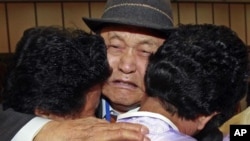The South Korean Unification Ministry's annual report calls the Sunshine Policy of peaceful engagement with North Korea a failure.
The ministry's white paper, issued Thursday, contends a decade of cooperation, cross-border exchanges and billions of dollars in aid did not change Pyongyang's behavior or improve the lives of North Korean citizens.
Lee Jong-joo, a ministry spokeswoman, says South Korea's goal is to see North Korea prosper, but Seoul must respond appropriately to any provocations from Pyongyang.
Compared with the previous two administrations here, North-South relations have significantly cooled under President Lee Myung-bak.
Mr. Lee, since taking office in 2008, has insisted North Korea give up its pursuit of nuclear weapons if it wants badly needed food and other aid from Seoul.
His conservative government points to North Korea's continued nuclear programs and this year's sinking of a South Korean warship as examples of deception by Pyongyang.
The white paper's publication was delayed six months to include information on the sinking of the Cheonan navy ship in March.
Pyongyang denies responsibility for the sinking. An international investigation concluded the ship was hit by a North Korean torpedo.
Park Young-Ho is a senior research fellow at the government-funded Korea Institute for National Unification. He says Mr. Lee's administration is trying to establish a relationship based on rules with the North.
Park says this is a shift, in response to four decades of Pyongyang's questionable attitude towards inter-Korean engagement.
The ministry's report complains about the lack of progress on other critical issues, including reuniting separated families and the release or information about South Korean prisoners of war, as well as citizens abducted by the North's agents.
Referring to huge payments Seoul secretly made to Pyongyang to bring about a 2000 summit of the countries' leaders, the Unification Ministry says any future engagement must be done transparently.
The policy document does stress the importance of dialogue between Seoul and Pyongyang.
On Thursday, Pyongyang sent a message to Seoul saying it is prepared to discuss the status of a jointly run resort in the North when their Red Cross societies hold talks next week.
South Korea's government has asked Pyongyang to release assets it seized in Seoul's portion of the Mount Kumgang resort.
Tours to the resort were a rare source of hard currency for the impoverished North. Seoul suspended the program in 2008 when a North Korean guard shot and killed a South Korean tourist near the resort.
South Korea Formally Declares End to Sunshine Policy




